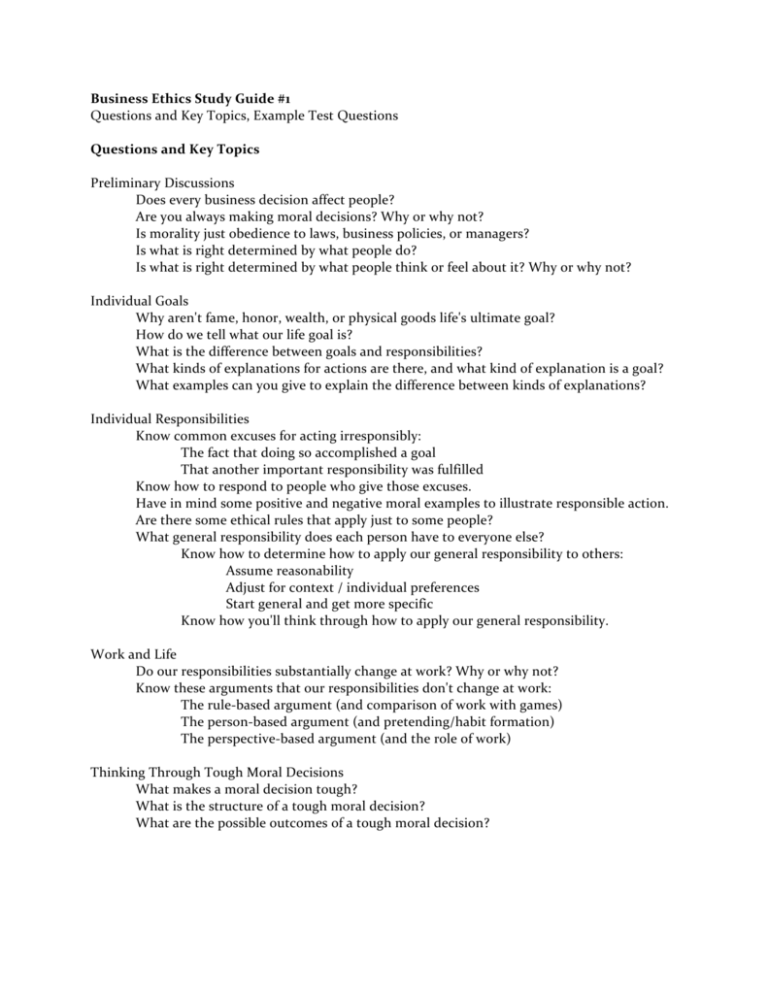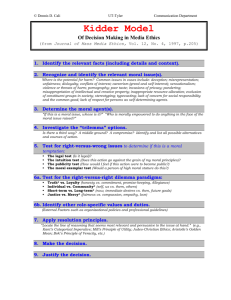Business Ethics Study Guide
advertisement

Business Ethics Study Guide #1 Questions and Key Topics, Example Test Questions Questions and Key Topics Preliminary Discussions Does every business decision affect people? Are you always making moral decisions? Why or why not? Is morality just obedience to laws, business policies, or managers? Is what is right determined by what people do? Is what is right determined by what people think or feel about it? Why or why not? Individual Goals Why aren't fame, honor, wealth, or physical goods life's ultimate goal? How do we tell what our life goal is? What is the difference between goals and responsibilities? What kinds of explanations for actions are there, and what kind of explanation is a goal? What examples can you give to explain the difference between kinds of explanations? Individual Responsibilities Know common excuses for acting irresponsibly: The fact that doing so accomplished a goal That another important responsibility was fulfilled Know how to respond to people who give those excuses. Have in mind some positive and negative moral examples to illustrate responsible action. Are there some ethical rules that apply just to some people? What general responsibility does each person have to everyone else? Know how to determine how to apply our general responsibility to others: Assume reasonability Adjust for context / individual preferences Start general and get more specific Know how you'll think through how to apply our general responsibility. Work and Life Do our responsibilities substantially change at work? Why or why not? Know these arguments that our responsibilities don't change at work: The rule-­‐based argument (and comparison of work with games) The person-­‐based argument (and pretending/habit formation) The perspective-­‐based argument (and the role of work) Thinking Through Tough Moral Decisions What makes a moral decision tough? What is the structure of a tough moral decision? What are the possible outcomes of a tough moral decision? Example Test Questions 1. Someone from the accounting department in your company brags to you that he found a way to cut costs: reduce health insurance and retirement benefits for employees across the board. He knows he'll get complaints, but the job market is pretty tight; it'll be hard for people to find employment with better benefits, because those jobs just aren't available, so people won't really leave the company. He's going to give the proposal to the CEO tomorrow. You're on the executive panel, and if he gives the proposal, you'll hear it and have a chance to respond. But you can say something now and possibly prevent the proposal from ever getting off the ground. You know several employees who would have a much harder life without those benefits, and you know it'd put several employees' families' health in jeopardy. You think your accountant friend isn't thinking about the moral implications of making the cuts. What can you say to your accountant friend to help him realize that his decision is a moral decision? 2. A sales co-­‐worker of yours wants to make a large-­‐commission deal, but the potential customer refuses; the price is way too high, he says. Your sales co-­‐worker friend says she knows how to make the deal. She'll take him out for drinks and sleep with him to make the sale. You say it's not worth it; that doesn't seem right. She says that this happens in sales all the time—it's pretty much a commonly-­‐accepted sales practice, and if you were in sales, you'd understand. Write down the argument she's making. How do you respond? What examples can you offer her to show her that her reasoning isn't very good? 3. Three years from now, an old Baylor classmate of yours joins your company. You notice that he acts similarly to how he used to act when he's not working—friendly and fun—but when he's at work, he's cutthroat, and he lies and deceives people frequently in order to get ahead. You point out this difference. He says his work life is different than his real life, and the rules are just different at work. He adds: at work, you just do what you can to get ahead. You want to help him realize that his responsibilities inside and outside of work aren't different. What are two approaches you can take to try to convince him of this? 4. You're part of the human resources team at a national bank. The team is thinking about sending out a memo and posting some posters to motivate employees to develop innovative business solutions. Their poster reads: "Does it help the company? Is it legal? Then make it happen!" Do you agree with the poster? Why or why not? What might you say to convince the rest of the HR team not to publish the poster and memo as it currently is? 5. You're the director of quality assurance at your company. The personnel director tells you he wants to fire 50% of the employees over 50 years old and replace them with new recruits. You ask why. "Severance packages cost a lot less than retirement packages," he says. He wants you to find defects in their work as a basis for letting them go. He tells you he'll give you a "pretty hefty bonus" for doing to this extra work, "even though it's part of your job anyway, if you know what I mean." You tell him the company shouldn't discriminate based on age. He replies, "I'm not. I'm discriminating based on performance. You're helping me assess their performance. See what I mean? My job is to help the company's bottom line, and yours is, too. Get me?" What excuse is the personnel director providing, and how do you respond? 6. After your response, the personnel director says, "Okay, but look: we've given them employment for 20-­‐something years. They should be thanking us, even if we let them go now." What excuse is the personnel director providing now, and how do you respond? 7. You're an accountant responsible for entering your company's inventory into the balance sheet. The supply chain manager gives you the numbers, but the CFO tells you to double count some items in the inventory to make your company's assets look higher than they are. She tells you she's only 2 basis points under company targets, and this will make it right on. She specifies which numbers she's asking you to inflate, adds, "Also, we didn't have this conversation," and leaves. At first you think: It's not my responsibility that items are being double counted. I just enter the numbers and make sure they're balanced. If someone gets blamed, it's not going to be me. Plus, I can just pretend it was a miscommunication between the supply chain manager and me, and that's not a fireable offense. But then you think: Wait; is that right? Or am I violating a responsibility by not saying anything? What responsibility do you have that you are violating by inflating inventory values? Make sure you say precisely what your responsibility is, whom it affects, why that matters, and how you went about determining what your responsibility is. 8. Your manager is having a 20-­‐person department-­‐wide meeting about business ethics to satisfy the company's requirements that it's employees "Make ethical decisions." He says he's only holding the meeting because he has to. "After all," he says, "I only believe the facts. You can't measure ethics. You can't test them. We've just made the whole damn thing up to satisfy an outdated traditionalistic belief system." What argument is he making? Where does it fail? What can you ask to point out how it fails? 9. You're an external consultant. When you observe the operations of a business you're consulting with, you find what seems to be an inefficient business practice. You find the manager in charge of implementing the practice and ask her why the practice is done the way it is. She responds, "Because I asked them to do it." You say, "No, I mean, why did you ask them to do it?" She responds, "I decided to." You think she doesn't understand what you're asking. What kind of explanation is she giving? What kind of explanation do you want her to provide? What example can you give her to explain the difference? How would you communicate this to her? 10. One of the middle managers in your company is always promoting herself. You say something about it. She says her ultimate goal is to be well-­‐known within the company. You remember back to your business ethics class: being well-­‐known isn't really anyone's ultimate goal. How do you show her this?









